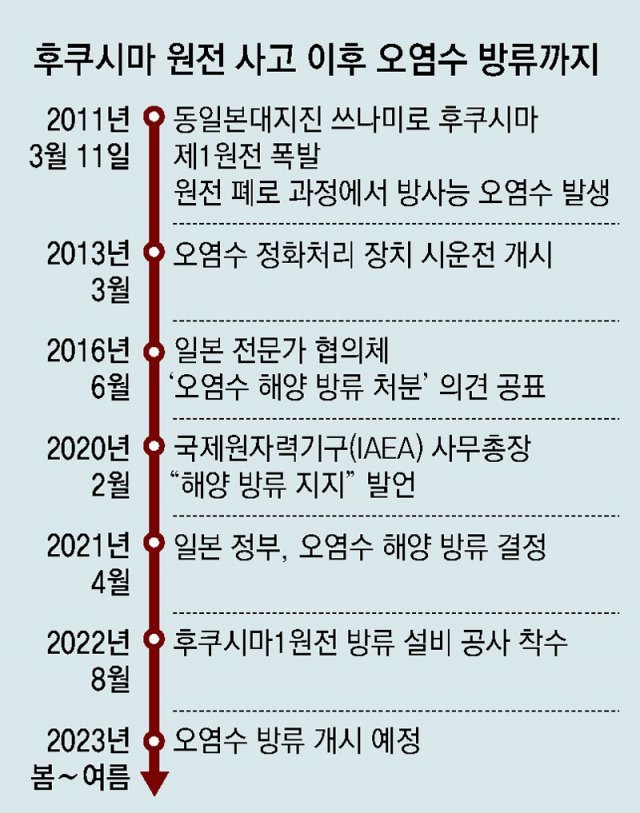Japan ahead of release of polluted water this spring and summer
Domestic and international public opinion contests such as tours to nuclear power plants
Korea-China “Cannot be released without the consent of neighboring countries”
Japan “Acquired IAEA verification… No problem”
While the discharge of radioactively contaminated water from the Fukushima Daiichi Nuclear Power Plant in Japan has entered a countdown, the Japanese government has launched a public opinion war at home and abroad to justify the discharge of contaminated water. Japan, which is the chair of this year’s G7 meeting, is also reviewing a plan to include a phrase in the G7 joint statement that it welcomes a transparent process for discharge of contaminated water.
The South Korean government has great concerns about Japan’s discharge of contaminated water, but it is agonizing over the lack of means to prevent it. As Korea, which is geographically close, is exposed to the most contaminated water, it is emphasized that it is necessary to verify and confirm the treatment of contaminated water in which both Korea and Japan participate separately from the review of the International Atomic Energy Agency (IAEA). However, if the conflict with contaminated water intensifies, existing issues such as comfort women and compensation for victims of forced labor could further strain the already complicated relationship between Korea and Japan, raising concerns.
Japan decided to discharge contaminated water into the ocean in 2021 and started construction of facilities last year. Fumio Kishida’s cabinet has decided to begin releasing fish into the Pacific Ocean between spring and summer this year.
According to the Asahi Shimbun, the Kishida cabinet proposed to the G7 member countries to specify the phrase ‘welcome a transparent process for discharge’ in the joint statement regarding contaminated water at the G7 Climate, Energy and Environment Ministerial Meeting held in Sapporo, Hokkaido in April. . It is said that they will drive public opinion with the G7 on their backs. However, there are countries such as Germany that are cautious about nuclear power, so it is unknown whether it will be realized.
Tokyo Electric Power, the operator of the Fukushima nuclear power plant, recently created a new page on its website that collects data on contaminated water. Here, phrases such as “removal of radioactive substances other than tritium” and “tritium does not accumulate in the human body” were added and related videos were also posted. The Ministry of Environment also held a field trip event covering the Fukushima nuclear power plant for domestic and foreign reporters in the middle of this month. The Ministry of Economy, Trade and Industry will also hold a briefing on ocean discharge of contaminated water for foreign media next month.

Fukushima contaminated water was caused by the inflow of rainwater and groundwater into nuclear fuel cooling water after the Fukushima nuclear power plant exploded due to the Great East Japan Earthquake and Tsunami in March 2011. There are radioactive substances such as tritium and cesium that can have adverse effects on the human body. TEPCO has purified this contaminated water with ALPS, stored it in tanks, and stored it within the site of the Fukushima nuclear power plant. Currently, a total of 1.32 million cubic meters of contaminated water is stored, which is enough to fill the Tokyo Dome (1.24 million cubic meters) in Japan. The Japanese government insists that “the risk is not great even if most of the radioactive material is removed and released.” Environmental groups oppose that “tritium, etc., which cannot be filtered out by ALPS, remains.” In response, the IAEA decided to review the safety of contaminated water treatment with the participation of South Korea and others and announce a report before and after discharge.
In July of last year, President Seok-Yeol Yoon said, “Ever since the presidential election, (Japan) has insisted that it be transparently explained to neighboring countries (regarding the discharge of contaminated water) and obtain their consent.” The Ministry of Maritime Affairs and Fisheries plans to raise an issue based on the ‘London Protocol’ that prevents waste from being dumped into the sea.
China is also protesting. On the 18th, Wang Yi, a member of the Politburo of the Central Committee of the Communist Party of China, who served as the diplomatic commander, said, “As this is a matter related to public health and the marine environment, Japan should not release it arbitrarily.” There is also considerable resistance from within Japan, centered on Fukushima fishermen’s groups.
The Kishida cabinet is in the position that there is no problem because it is released after being verified by the IAEA. Foreign Minister Hayashi Yoshimasa recently said, “We will monitor before and after the release. Information will be disclosed in a transparent manner.”
Tokyo =
Source: Donga
Mark Jones is a world traveler and journalist for News Rebeat. With a curious mind and a love of adventure, Mark brings a unique perspective to the latest global events and provides in-depth and thought-provoking coverage of the world at large.